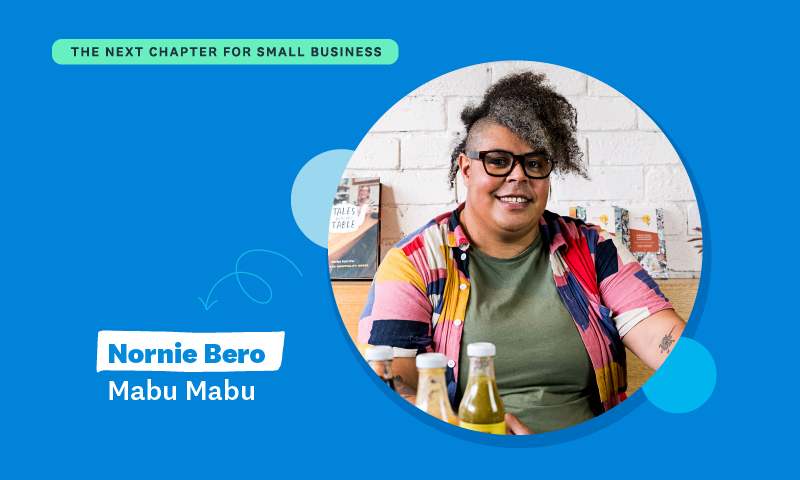
In this series, we uncover honest personal accounts of the heartbreaks, trials and triumphs that have made up 2020. By charting the full scope of the small business experience, together we stand to come back stronger than ever.
Having grown up in a single-parent family on Mer Island in the Torres Strait, Nornie Bero knows firsthand that innovation is often born out of hardship. So when Mabu Mabu, her Indigenous cafe and catering business in Melbourne’s Yarraville, had to close its doors following the arrival of the pandemic, she knew where to look for inspiration: her father.
“We lived in a little brick house built by the government and our electricity came from generators. You needed to buy petrol to get power – and petrol was expensive. Dad needed to come up with something fast if we were going to survive.”
Luckily, Nornie’s father had a deep love for food and an idea at the ready. “Dad really liked to cook, so decided to turn half of our house into a tuck shop. He put a bamboo wall down the middle and woke up early every morning to make fresh dampers, pumpkin buns and fish burgers for all of the locals.”
Going back to her roots and seeking inspiration from home
Mabu Mabu is a term from the Torres Strait that translates to ‘help yourself.’ Nornie’s business started by selling condiments derived from native ingredients at South Melbourne Market, before expanding into catering. Then, came her cafe in Yarraville (chosen for its village-like feel), devoted to using Indigenous herbs, fruits, succulents and spices in all of its dishes.
“We’d only recently opened the cafe when the virus hit. Once lockdown happened, I thought, ‘Oh my God, what am I going to do? I have staff members that have families. I have staff members from overseas. How are we going to make sure they stay employed during this time?’”
Nornie spent a week and a half deep in thought, trying not to give in to the rising panic she was feeling. Then, remembering her father’s resourcefulness, she decided to reopen with an online store selling Mabu Mabu’s own native produce. And, ahead of its future physical reopening, she rebranded the cafe arm of the business as Mabu Mabu Tuckshop in her dad’s honour.
Customers could now find everything from a pepper berry spice mix to Nornie’s special Island Marinade on the Mabu Mabu website (as well as being stocked by over 20 stores). But, something was missing. In Nornie’s words, “If we were going to make it through, I knew we needed to come up with fresh ideas and embrace what makes us unique.”
Introducing native ingredients to pantries across the country
Inspired by that original tuckshop on the islands, Mabu Mabu’s online cooking classes teach people how to make home-style meals such as saltbush damper and wattleseed pavlova (complete with ingredient kits). Then, there are the bespoke tea sets that come with billy mugs, strainers and the scents of strawberry gum leaf and cinnamon myrtle.
“We’re all Aussies, yet most of us know so little about Australian produce. From day one, my entire mission has been to get people to have at least one native ingredient in their pantry. Now, with everyone suddenly at home, we’ve found the opportunity to share our products even wider – and show how easy it is to use them everyday.”
Calling on the power of community
Throughout it all, Nornie has never lost sight of the power of community. “I’m incredibly thankful for our Yarraville locals because they took the opportunity to support every business on the block. We wouldn’t have been able to survive without them.”
The Next Chapter for Small Business, a commissioned study conducted by Forrester Consulting on behalf of Xero, further highlights the value Australian consumers place on businesses like Nornie’s, with 87 percent agreeing that small businesses played an active role in shaping the culture of their local community.
As the research uncovers, this lasting relationship provides confidence to small businesses, with 67 percent of Australian small businesses believing they have a competitive advantage over large enterprises. Something that Nornie agrees with, “It’s about that personal touch. I think small businesses will always stay around because, at the end of the day, customers want to interact with real people.”
As Mabu Mabu continues to adapt and innovate, it’s evident that the changes to Nornie’s business promise to prove beneficial long after the pandemic ceases. “Dad passed away a few years ago, and wherever he is now, I hope he’s proud to see me embrace those very same survival skills he put in action.”
To find out how the pandemic has impacted small businesses across the globe and uncover five key recommendations to keep your business moving and thriving, download the The Next Chapter for Small Business at xero.com/the-next-chapter
Leave a Reply